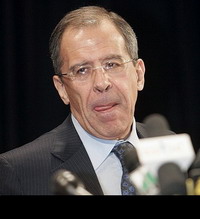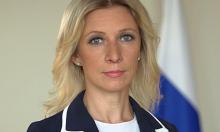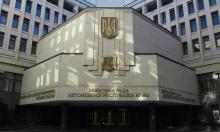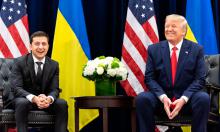Sergey Lavrov accuses Britain of politicizing Litvinenko's case
Sergey Lavrov said Friday that Britain is politicizing the investigation into the death of a former KGB agent and warned that it was straining relations between the two countries.

"Instead of a professional inquiry, we're seeing an attempt to turn the criminal case into some sort of a political campaign," Lavrov told reporters.
"It's having an impact" on bilateral ties, he said. The statement was in contrast to First Deputy Prime Minister Sergei Ivanov's assessment last week that the case was having little effect on relations.
Also Friday, the deputy interior minister alleged that the dead agent, Alexander Litvinenko, had gone to the war-battered Russian province of Chechnya to kill witnesses to alleged connections between Chechen separatist warlord Shamil Basayev and Boris Berezovsky, an exiled Russian tycoon and Kremlin critic who was a close associate of Litvinenko's in London.
Britain last month accused a former KGB agent-turned-businessman of killing Litvinenko, who had received British citizenship, and formally requested his extradition. Russia refused, saying it could prosecute Andrei Lugovoi at home if Britain presented enough evidence.
Lavrov's remarks followed Lugovoi's claim Thursday that British intelligence services had a hand in the slaying.
Litvinenko, a renegade member of the Russian secret services hated by many former colleagues, died in a London hospital in November after being poisoned with radioactive polonium-210. He accused President Vladimir Putin on his deathbed of being behind his killing - charges the Kremlin has angrily denied.
Lugovoi, a Moscow businessman who met with Litvinenko on Nov. 1 in London, hours before the former agent fell ill, described the British accusations against him as an effort to shift suspicion away from the British spy services, who he said might be implicated in the crime. He said he would give evidence of their involvement only to Russian investigators.
The British Foreign Office declined comment.
Lugovoi claimed that Litvinenko tried to recruit him to work for MI6, Britain's foreign intelligence agency, and to gather compromising materials about Putin and his family. He also claimed Berezovsky was working for British intelligence.
Russian authorities have sought Berezovsky's extradition to face charges of economic crimes that Berezovsky says are politically motivated. Lugovoi also suggested that Berezovsky could have been behind Litvinenko's killing, purportedly for having evidence that Berezovsky had received asylum under false pretenses.
In another accusation against the tycoon who once was a Kremlin insider, Deputy Interior Minister Arkady Yedelev said Berezovsky had funded Chechen rebels, the ITAR-Tass news agency reported.
"We have reliable information about Litvinenko's stay in Chechnya. ... He came to remove traces of Berezovsky's funding illegal paramilitary groups and Basayev's contacts," Yedelev was quoted as saying. He declined to say when the alleged trip occurred, the agency said.
Meanwhile, human rights activists said a former security agent who claimed to have warned Litvinenko that a government-sponsored death squad was targeting him could die of asthma in his Siberian prison if authorities continue refusing to hospitalize him.
Mikhail Trepashkin, a former colonel in the Federal Security Service, the main KGB successor agency, is serving a four-year sentence for revealing state secrets.
"Conditions behind bars jeopardize his life," said rights activist and Kremlin critic Lev Ponomaryov. "He has bad asthma with allergic complications, and prison doctors stuff him with inadequate drugs."
Trepashkin, 50, is imprisoned near a large industrial plant whose toxic emissions badly aggravated his condition, Ponomaryov said.
Officials have rejected appeals that he be hospitalized or transferred from the prison in Nizhny Tagil, 1,200 kilometers (750 miles) east of Moscow.
In letters released by his lawyers last year, Trepashkin said he had warned Litvinenko about a government-sponsored death squad that intended to kill him and other Kremlin opponents.
Russia's top prosecutor dismissed the letters as "stupidity" and refused to allow British investigators to talk to Trepashkin during a December trip to investigate Litvinenko's poisoning.
Trepashkin "fell victim of a typical KGB revenge, and they want to wreck him physically," said Valentin Gefter, director of the Moscow-based Human Rights Institute.
Subscribe to Pravda.Ru Telegram channel, Facebook, RSS!





